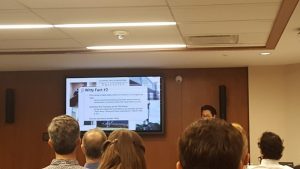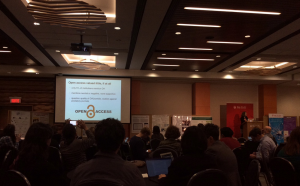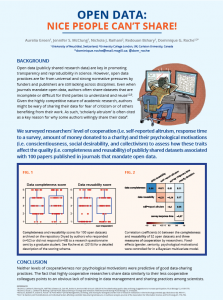Introduction
Further to my post Planning to get the most out of FORCE2018, written before the conference, I have been back from Montreal for over a fortnight now and have had time to reflect on the key points I have learned from the experience, as well as how I wish to integrate this into my professional work moving forwards.
I participated in a publisher-led conversation about what support we might want to see from them regarding open access books and was encouraged to submit a poster at the conference, which I found to be a beneficial experience. Standing by this during the poster sessions led to several engaging discussions with people from across the open scholarship environment, from a lawyer, a fellow researcher, librarians and publishers. I found it encouraging that people with a variety of outlooks, coming from a variety of professional backgrounds and personal interests, could also appreciate the positivity of Creative Commons licences and consider the ways in which their use can be extended beyond academia, in addition to across the research and teaching process.
In my previous write-up, I said I was particularly looking forward to Asura Enkhbayar’s presentation linking Wittgenstein and scholarly communications. I found this humorous and insightful, and it was great to see it appreciated by a room full of enthusiastic attendees on the first session of the first official day.

Asura Enkhbayar presenting ‘Throwing away the ladder. Wittgenstein’s philosophy and and scholarly communication’
Central Themes
Over the course of the workshops and presentations (from October 10-12, 2018), I was struck by the proportion of the challenges that were discussed in an international setting that are the same as those that we face in the UK. This convinced me that the move towards open scholarship is a global challenge that we must tackle from both local and international settings.
What follows is a brief summary, in which I seek to highlight my conviction that the academic reward structure must be revisited as a matter of priority to ensure that the effect of associated procedures are not detrimental to the progression of open scholarship or the mental wellbeing of academics. The failure to protect either of these is also the failure to ensure the flourishing of the pursuit of knowledge in our societies. It seems to me that one constructive way we might confront such a challenge is by doubling down on our efforts to further existing commitment for essential initiatives like the San Francisco Declaration on Research Assessment (DORA).
Open Access and Academic Reward and Recognition Policies
A theme that struck me throughout the conference was the need to ensure that mission statements of institutions and reward procedures align with initiatives prioritising open research.
Erin McKiernan’s excellent presentation demonstrated the extent of the disparity between academic promotion procedures and open research. I was alarmed by the results, which showed that words that appeared regularly within tenure review documents include ‘public’, ‘community’, ‘public engagement’ and ‘community engagement’, all of which have close affiliations with open research, whilst only 5% of analysed documents directly mention ‘open access’. Moreover when such documents mentioned ‘open access’ they often did so with neutral or even negative connotations. This highlighted to me that the challenges we face in Europe are shared by institutions in North America, and most likely, also elsewhere. It consequently convinced me of the need to direct extensive efforts in this area, particularly towards encouraging a culture shift in those who are empowered to revise reward procedures.

Erin McKiernan presenting ‘A look at public engagement, publication outputs and metrics in the tenure review process’
We oug ht to combine this ongoing effort with those that guide researchers who are earlier on in their careers, who are most receptive to adopting good practice, which can have a ripple effect, informing the practice of their colleagues. As such, Dominique Roche’s presentation ‘Open data: nice people can’t share!’ (summarised in his poster) touched upon a welcome topic by examining why researchers might be hesitant to share their work. An understanding of this can help drive a culture change that works from the ground up.
ht to combine this ongoing effort with those that guide researchers who are earlier on in their careers, who are most receptive to adopting good practice, which can have a ripple effect, informing the practice of their colleagues. As such, Dominique Roche’s presentation ‘Open data: nice people can’t share!’ (summarised in his poster) touched upon a welcome topic by examining why researchers might be hesitant to share their work. An understanding of this can help drive a culture change that works from the ground up.
San Francisco Declaration on Research Assessment (DORA)
Returning to the findings of Erin McKiernan’s presentation, these led me to consider a theme that emerged at an open access meeting in London (known as the ‘London Open Access Network’, or ‘LOAN’ meeting) the week prior to the conference. At this meeting, a colleague shared thoughts on an event that took place in September, ‘Mapping the Future of Research Assessment’ at Imperial College London. This event (#ImperialDora) associated the theme of review procedures with the need to consecrate the ethos of the San Francisco Declaration on Research Assessment (DORA) (of which London School of Hygiene & Tropical Medicine is a signatory) with institutional policies. Many stakeholders are working to improve good practice within this area, striving to promote real change in research assessment, but challenges remain. The Imperial College event highlighted, as outlined in Elizabeth Gadd’s post on the LSE Impact Blog, the need to ensure that such practices are not in conflict with the necessity to protect and foster mental health within Higher Education Environments, amongst staff and students alike. This seems to me an area that we at LSHTM, a School that underlined our commitment to tackling stigma surrounding mental health by signing the Time to Change Employer’s Pledge, have to take seriously.
LSHTM Open Access Week – Screening ‘Paywall the Movie’
One event that LSHTM ran for our open access month series was a screening of the movie ‘Paywall: the Business of Scholarship’ (in which many attendees of FORCE2018 are featured!). In the post-screening discussion, one member of staff noted the continued and problematic use of impact factors in review procedures. This prompted an interesting discussion within the room similar to that which took place during many of the presentations at FORCE2018, notably, during the questions after Elisabeth Shook’s presentation ‘Thanks, Sci-Hub!’.
This too convinced me of the global commonality of such issues within Higher Education. The theme of impact factors (created by Eugene Garfield for selecting journals to include in the Science Citation Index in the 1960s,) which are no longer deemed credible, was examined in another engaging session at FORCE2018 by the bibliometrician Stefanie Haustein, who ran a metrics literacy quiz on Twitter during her talk. Within her talk, Stefanie highlighted that the impact factor is mentioned by one fifth of Canadian and US universities in review, tenure and promotion documents, despite having widely been recognised to cause harm to scholarly communication by causing ‘salami publishing’, ‘citation cartels’ and fostering a problematic ‘publish or perish’ mentality.
Overall, the event reminded me of the shared work that we have to do as a community concerned with open scholarship. It left me feeling lucky to reside in London (although Montreal was beautiful to see in the Autumn!) where participating in such a community can occur with relative ease thanks to networks like ‘LOAN’ bringing together workers promoting open research in various institutions. In the meantime, I would encourage individual researchers and organisations to read and sign DORA and express these values when they hear of the use of impact factors to make unjustified claims for the quality of research.











